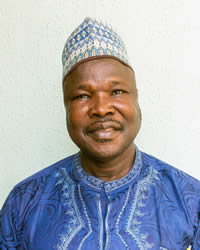Kanuri, Yerwa in Chad

Photo Source:
Copyrighted © 2026
Kerry Olson All rights reserved. Used with permission |
Send Joshua Project a map of this people group.
|
| People Name: | Kanuri, Yerwa |
| Country: | Chad |
| 10/40 Window: | Yes |
| Population: | 237,000 |
| World Population: | 9,373,000 |
| Primary Language: | Kanuri, Yerwa |
| Primary Religion: | Islam |
| Christian Adherents: | 0.01 % |
| Evangelicals: | 0.00 % |
| Scripture: | New Testament |
| Ministry Resources: | Yes |
| Jesus Film: | Yes |
| Audio Recordings: | Yes |
| People Cluster: | Kanuri-Saharan |
| Affinity Bloc: | Sub-Saharan Peoples |
| Progress Level: |
|
Introduction / History
The Kanuri tribes consist of the Yerwa Kanuri, the Manga Kanuri, and several other sub-tribes. The majority of the Kanuri live in the Borno Province of northeastern Nigeria, where they are the dominant people group. They are also located in the countries of Niger, Chad, and Cameroon, and areas around Lake Chad. This region was once the powerful Borno Empire, ruled by the ancestors of the Kanuri. Others live in western Sudan, especially the Yerwa Kanuri.
The Kanuri began losing power in this region when the British took control in 1914. Nevertheless, they have remained politically active and still have much influence on the surrounding people groups. In fact, aspects of Kanuri culture, language and religion have been adopted by many of the neighboring tribes.
The Kanuri have pride and appreciation for their past as rulers, as well as their present position of leadership and influence. Many Kanuri speak Hausa, Arabic, or another area language in addition to Kanuri.
What Are Their Lives Like?
Most of the Kanuri are farmers; however, they usually practice some other occupation during the dry season. Those who farm raise millet as their staple crop, and supplement it with sorghum, corn and peanuts. They raise sheep, goats and some horses. Among the Kanuri, owning horses brings prestige.
The Yerwa Kanuri who live in cities are involved in government jobs, public service, construction, transportation, and commerce. The Yerwa Kanuri who have occupations that are related to politics or religion have a very high social status. Those who work as blacksmiths, well-diggers, or butchers have a low social status. The majority of the Yerwa Kanuri, however, are farmers, craftsmen and merchants.
Kanuri settlements vary in size; but most contain walled-in compounds surrounding several mud or grass houses with thatched, cone-shaped roofs. These houses are very cool during the hot months. Farmland surrounds each settlement.
Towns serve as local markets and administrative centers for the Yerwa Kanuri. They contain a local school and mosque. Attached to the mosque are smaller schools for religious teachings.
The household (not the family itself) is an important economic unit to the Kanuri. The greater the number in a family, the more prestige the family head has. For this reason, young men are often loaned to households to help with field labor, to provide support, and to help in defending the family. In return, the head of the household will clothe the young man, feed him, pay his bride price, and possibly provide a bride for him. At that time, he will leave and start his own household. This type of relationship is widespread in Yerwa Kanuri society. The head of the household enjoys supreme loyalty.
Kanuri men marry while they are in their early twenties. Polygamy is common and a man may have as many as four wives. Girls marry while they are in their teens. Ideally, a man wants his first wife to be a young virgin. However, the bride price for a virgin is quite expensive, so men often take divorced women as their first wives. The divorce rate among the Kanuri is extremely high, with eight out of ten marriages ending in divorce. The effect is that most Kanuri families are broken and stitched back together, only to be broken again.
What Are Their Beliefs?
The Kanuri have been Muslims since the eleventh century. Kanuri Muslims still practice folk rituals in conjunction with Islam. For various reasons they wear charms and amulets around their necks or keep them in their pockets. There is a charm to ensure a good pregnancy for a mother. There is also one to keep the ghost of the dead from haunting its descendants. They put their faith in the power of these charms.
What Are Their Needs?
Yerwa Kanuri families need help in staying together. Perhaps believers who are gifted in bringing reconciliation can help marriages stay together.
Prayer Points
Pray for the Lord to heal Yerwa Kanuri marriages and lead them into the love and respect it takes for a lasting union.
Pray for God to give dreams of the victorious, risen Christ to Yerwa Kanuri elders.
Pray for a spiritual hunger among the Yerwa Kanuri that will lead them to seek and find Jesus Christ.
Pray for the Lord to thrust out Holy Spirit-driven workers to lead the Yerwa Kanuri people to the cross.
Pray for a movement to Christ among all Kanuri subgroups.